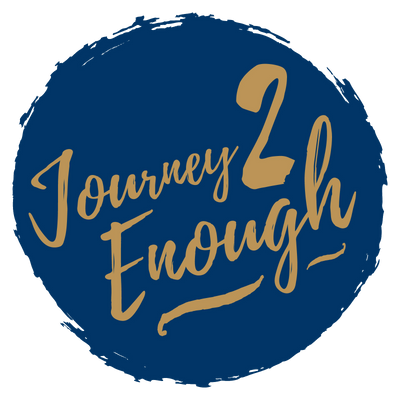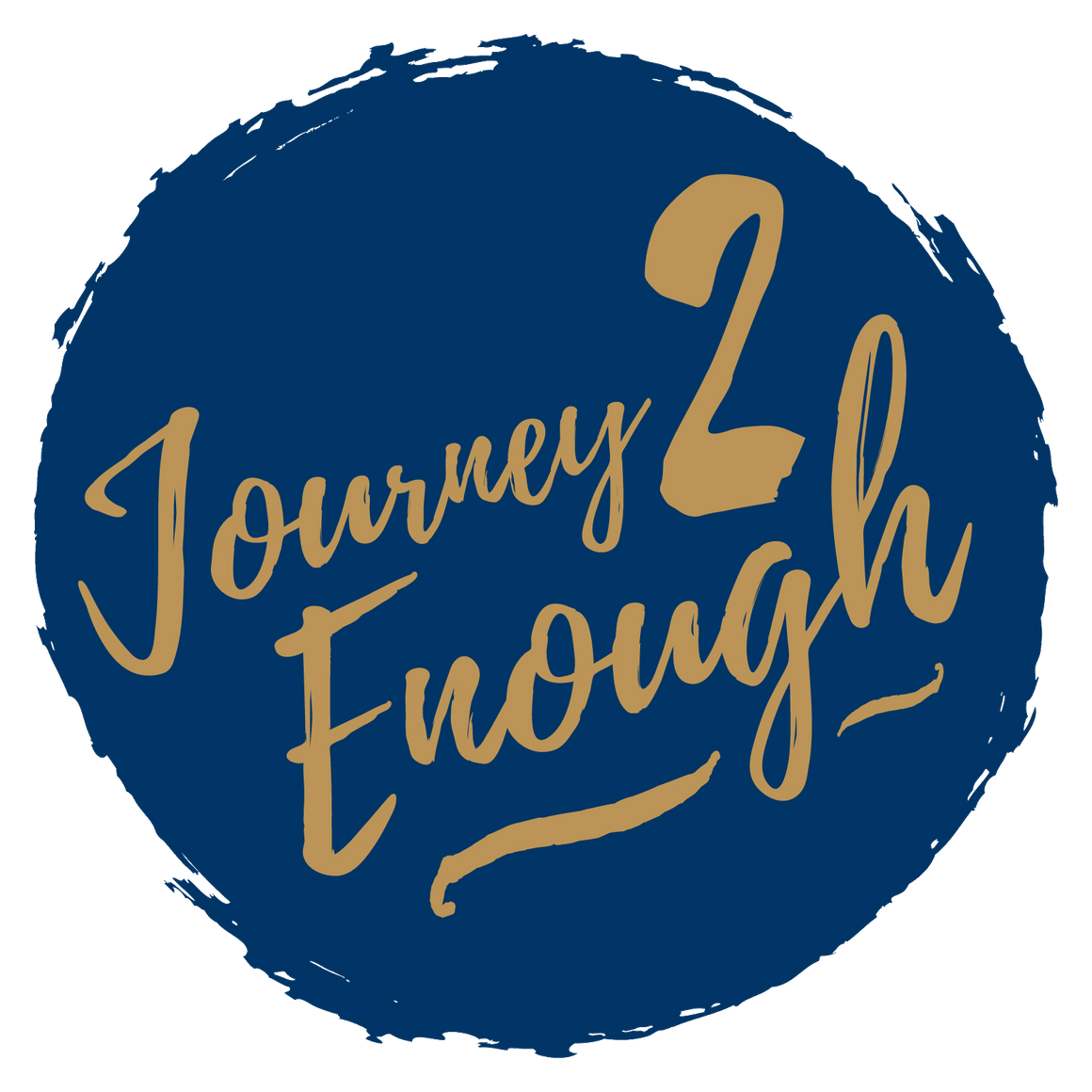Karimi Fondaumiere

1.Who are you?
There are so many titles I could ascribe to who I am, mom, CEO, sister, friend – but this is part of the challenge - playing and juggling multiple roles and sometimes getting lost in those titles and how they define our identity, or in my case living a life of pursuing perfection in holding all those titles and identities – as if this was even possible!
Who I am is really a woman who is navigating the world while “being and becoming”. I resonate with the duality of those concepts because it embraces that who I am is “me” with all the parts of me, present and being the best version of that person today, yet at the same time I am evolving and not even the same today as I was yesterday, in both good and bad ways. But that growth, the moving along the scale of understanding myself and others is where there is deep possibility as well as both grace and power.
2.What does “Journey2Enough” mean to you?
Journey2Enough for me is encapsulated in the Japanese practice of Kintsugi. When I first heard about it, I loved it. I had also just done a pottery class as part of re-igniting my childhood interest in creativity and art, so it really resonated on several levels. Kintsugi is the art of mending broken ceramics with precious metals like liquid gold and the completed pieces have beautiful seams of gold or silver shining where there used to be “cracks” or imperfections. No single piece is the same once it is “repaired” but each piece is stunningly beautiful and made complete by its shimmering veins. That’s what I am trying to embrace in my journey to being enough. I want to bring all the parts of me that I perceive as broken, or that the world may see as imperfect and see the precious value it brings to me as a whole person. How each of those experiences and moments are shining seams in my life that make me uniquely me and that there is incredible beauty in that, which I need to embrace and step into. As you can hear, I don’t speak of this yet as a place that I have arrived, but instead still very much a place I am journeying to and towards which I am steadily working daily.
3.Ancient research and psychology has shown that it is believed that our source of inadequacy, starts very early in our childhood. What would you say was the source of your inadequacy when you were growing up and why? Or maybe it started in your adulthood. Speak to whatever makes sense to you.
The world is set up to honour performance. It starts when we are in school and the academic system celebrates top performers and then society and other structures follow suit. This world and this system gave me a scale on which to judge my success and I mistakenly also attached my identity and my value to that very same scale. I got lost in the pursuit of performance and the more acknowledgement and praise I got from the world, the more I believed that I needed to always be perfect to be accepted or valued, and once that happens, it’s very hard to find your base again. My journey to enough has been a story of finding my identity outside of other people’s perceptions and the world’s definitions of who I should be, but instead embracing my imperfections and my failures as critical parts of who I am.
4.How have you conquered it?
I have sadly not conquered it. There is some part of me that wonders if it is possible to fully conquer it, and that it’s not so much something to conquer or achieve, but a continuum where you keep moving towards one end (seeing yourself as enough) and away from the other end (constantly feeling lacking). I’m still very much on that journey and learning things every day that keep moving me forward towards the right end of that scale.
5.I believe we live in a world that is riddled with what I call the comparison pandemic that magnifies our inadequacies rather than magnify what we already have. How do you relate to this comparison pandemic?
I relate deeply to this pandemic. It is all consuming and sadly at its heart it is driven by all our own insecurities and low self-worth. This is what I think makes comparison so rife in our culture today, especially now that our lives (or at least the parts of it we choose to share) are so public and accessible to all. The whole world has become a stage to be judged and to judge others. Sometimes it even feels like competing to see who can out-judge the other. It’s hilarious to think about.
Without a grounded view of ourselves or our self-worth then the comparisons become something we crave to make ourselves feel better as we judge others for doing worse, or a never-ending plummet into feeling even less worthy and insufficient, when we deem ourselves to be less comparable. I have had to actively choose to leave platforms and spaces where I felt myself drawn into this behaviour and regularly do a self-check on my emotions and whether they are driven by misplaced or unhealthy comparisons.
6.What do you practice if you do, to magnify what you have rather than contribute to the “i am not good enough narrative”
I have found journaling to be very powerful in unpacking below the surface emotions and perceptions I am carrying. I try to do this regularly, but particularly when I am feeling the “not good enough narrative” playing out. A big part of the journaling that helps with this is a gratitude practice, where I focus away from my ‘not-enoughness’ towards all the ways I have been blessed and the joy in both the small and big elements of life. This helps counter the insecurity that underlies a lot of the negative emotion.
7.Research has shown that women suffer from “craving of being liked” as compared to men who will rock up and do what needs to be done without considering repercussions, have you experienced that? The likability challenge? And how have you dealt with it?
I have definitely experienced the need to be likeable and I have had to work hard to figure out which part of me was showing up in different situations. I would say I have dealt with it by doubling down on things that make me…me! Sharing something vulnerable in that moment and knowing that this is what makes me human and real. Interestingly, I have found that people relate better when they felt they were not getting a pretense and so I repeat the mantra to myself as encouragement: “there has been no other version of you before, you can only be you, so define what that is fully and see where it takes you! Spaces where you don’t fit were perhaps not meant for you in the first place.”
8.What would you say to someone sitting at home and feeling inadequate in whatever sphere of their life? Because what we know is the feeling of inadequacy has levels and spheres. You could be making it in your professional life but something in your personal life is not going so well and is making you feel like you are not enough? How does one transfer that feeling of being whole from one sphere to the next?
To someone who is feeling inadequate…I would say “me too!” – because it is true. I don’t go through life feeling whole in every moment, but instead what I try to challenge is my definition of “whole” and I would say that to anyone feeling inadequate; Find out what it is that is driving and informing your view of perfection or adequacy. More often than not it is a misplaced scale and standard. Then work daily at resetting the scale for yourself, based on your definitions. There is no perfect mom, or wife, or boss, just multiple versions of people doing it in their own way, in the best way they can. If you are doing that, then you are doing enough, relax those expectations and enjoy the journey of growth you are on, not the pursuit of a perfect destination.
9.What is the one thing that you live by that helps you snap out of feeling inadequate?
Being honest and sharing what I am feeling. It is admitting out loud that I am struggling and often, that moment of embracing it and the vulnerability in the confession breaks me from the struggle of trying to be perfect and not measuring up. Often what I’m feeling also sounds less important out loud or when I share it with someone else, and that helps me see the incorrect perception I might be carrying around that is making me feel less worthy.
10.What does courage mean to you?
Courage. It’s so intangible. It’s very nature is that you need to ‘have’ it when you least feel like it. You only realise you had it after the fact. Like looking back and realising “ok, that was courageous”. But in the moment? Can you really say I’m being courageous now? I think courage shows up as a choice, like the saying “choose courage over comfort” or “choose courage over fear”. This helps me understand courage and make it practical. I may not know what courage feels like in the moment, but I certainly know what comfort feels like and I know what fear feels like. In meetings, where it may be comfortable to sit and not share a contradictory opinion – I can choose not to be comfortable. In learning, where I am feeling comfortable in what I know and what I’m good at – I can choose to pick up something unknown and hard. I know those moments of choice. I feel them, and in those moments I choose the opposite and hope that in seeking the uncomfortable and the scary, I find courage along the way.
11.What have you learnt in your journey that has contributed to your journey to enough?
I have learnt to embrace all the parts of me. To embrace my journey and my story, to look deeply at everything that I am and accept all the elements there. It’s a choice I need to make daily to focus on the real and not the perceived. It’s like spending your life adrift at sea, then finally finding a shore. You have to keep walking and working to move further inland, so you don’t go adrift again. My journey to enough is a commitment to a lifetime of navigating this new world but making those steady steps inland, and every step makes a better, happier version of myself – because I am accepting all of things that make me complete.
12.What would you say to your younger self?
Jump! Leap! Speak! Try! …don’t worry so much or hold yourself back because of all the things you think you need to be or all the things the world is telling you that you should be! Be you! Do you!...LOVE you!
13.What is your hope for this movement?
That it liberates women from the constant pursuit of ideals and standards that are not real or healthy, and that this movement leads them to self-acceptance and embracing their whole selves!
Also in News

Sheronisa

Essie Sibanda



